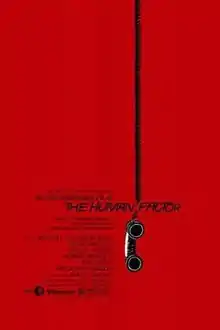The Human Factor (1979 film)
The Human Factor is a 1979 British neo noir thriller film directed and produced by Otto Preminger and starring Richard Attenborough, Nicol Williamson, Derek Jacobi and John Gielgud. It is based on the 1978 novel The Human Factor by Graham Greene, with the screenplay written by Tom Stoppard.[2] It examines British espionage, and the West's relationship with apartheid South Africa.
| The Human Factor | |
|---|---|
 Theatrical release poster by Saul Bass | |
| Directed by | Otto Preminger |
| Written by | Tom Stoppard |
| Based on | The Human Factor by Graham Greene |
| Starring | Richard Attenborough Derek Jacobi John Gielgud Nicol Williamson |
| Music by | Richard Logan Gary Logan |
| Cinematography | Mike Molloy |
| Edited by | Richard Trevor |
Production company | Sigma Production Wheel Productions |
| Distributed by | Rank Film Distributors (UK) United Artists (United States/Canada) |
Release date |
|
Running time | 115 mins |
| Country | United Kingdom |
| Language | English |
| Budget | $5,500,000 |
| Box office | $376,050[1] |
This was Preminger's last film.
Plot
Maurice Castle (Nicol Williamson) is a mid-level bureaucrat in MI6 whose life seems unremarkable, apart from the fact that he has an African wife, Sarah (Iman), and son, Sam (Gary Forbes). The company regime, represented by Dr. Percival (Robert Morley), an expert in assassinations and biological toxins, and éminence grise Sir John Hargreaves (Richard Vernon), advise newly appointed security chief Daintry (Richard Attenborough) that they believe they have a leak in Castle's department. The duo determine the mole must be quietly killed, rather than be allowed publicity in a trial or a flight to Moscow. They quickly decide the most likely candidate for the traitor is Arthur Davis (Derek Jacobi), Castle’s redbrick-educated playboy office partner.
Castle is actually the mole, but the information he leaks is mostly unimportant. He became involved in leaking to the Soviets when he was an MI6 agent in apartheid South Africa, seven years earlier: he met and fell in love with Sarah; when their affair was discovered by the authorities, Castle was thrown out of the country, and Sarah was smuggled out with the help of Matthew Connolly (Tony Vogel), whose Communist network Castle was originally assigned to spy upon. Ever since, Castle has been repaying the favor by passing information on via a contact in London. However, Castle is not a communist. His only interest is in his wife and son, who are ultimately left in London — where they remain separated from him.[3]
Cast
- Richard Attenborough as Colonel Daintry
- John Gielgud as Brigadier Tomlinson
- Derek Jacobi as Arthur Davis
- Robert Morley as Doctor Percival
- Ann Todd as Castle's Mother
- Nicol Williamson as Maurice Castle
- Iman as Sarah
- Joop Doderer as Cornelius Muller
- Richard Vernon as Sir John Hargreaves
- Angela Thorne as Lady Hargreaves
- Fiona Fullerton as Elizabeth
- Tony Haygarth as Buffy
- Tony Vogel as Matthew Connolly
- Martin Benson as Boris
- Marianne Stone as Matron
- Tom Chatto as General Phipps
- Adrienne Corri as Sylvia
- Sylvia Coleridge as Mrs. Halliday
- Frank Williams as Bellamy
Production
The film was shot in Kenya and at Shepperton and Pinewood Studios near London as well as on location at Berkhamsted. As with the book, much of the theme about alleged treason and suspicion is based on the defection of Kim Philby, a friend of Graham Greene, to the Soviets. The film also included Iman, who was working as a model before she began to work in films.
Preminger had trouble securing funding for the film and had to partially fund it with his own money.[4] Reportedly, Preminger wanted to cast the novelist Jeffrey Archer in the role played by Nicol Williamson. Archer, much shorter than Iman, failed his audition.[5]
Release
The film was the first acquired by Metro-Goldwyn-Mayer in six years since it stopped distributing film, for distribution in the United States and Canada, through United Artists.[6] The film was released for an Academy Awards qualifying run in Los Angeles, as well in New York City.[6]
References
- "The Human Factor (1979) - Box Office Mojo". www.boxofficemojo.com.
- BFI.org
- "The Human Factor (1979)". Retrieved 28 January 2020.
- Nat Segaloff, Final Cuts: The Last Films of 50 Great Directors, Bear Manor Media 2013 p 234-235
- "Rose Tobias Shaw, casting director - obituary". The Daily Telegraph. 10 November 2015. Retrieved 11 November 2015.
- "Preminger Picture Picked Up By MGM". Variety. 21 November 1979. p. 3.